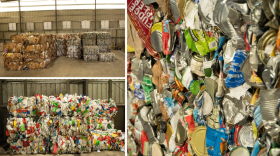This story is part of Michigan Public's series "Mornings in Michigan," which features morning moments from across the state.
For most people, the morning moment we’re talking about starts the night before when they put their recycling bins out on the street. But the big moment is when the recycling truck arrives the next day.
My two-year-old son is always hustling to a window or door whenever he hears one going by.
Recycle Ann Arbor driver Rodney Williams said he’s not alone. We caught up with him in June while he was on his route on Ann Arbor's north side
"Every day. Every day when I'm lifting the truck, or lifting the arm up, the kids are waving. They're screaming. They want me to pull the horn. I pull the horn for them. You know, I wave to all the kids that I see. They put a smile on my face because I’ve got young kids, so I just want to make them happy," Williams said.
Bins, bins, and more bins
Recycle Ann Arbor is a nonprofit that collects commercial and residential recycling in Ann Arbor and Ypsilanti. A few of us from Michigan Public came out to find out what happens to all that plastic, paper, glass, and metal you’ve been chucking into your recycling bin all week.

Williams let me hop into the cab. He was in the driver’s seat and I was in the other driver’s seat. These trucks are dual-op with steering wheels and pedals on both sides. In the center console, there’s a black joystick with yellow buttons for the robotic arm that grabs the barrels.
Williams joined Recycle Ann Arbor in November and so far, one pickup stands out.
"Man, some people try to get away with dumping trash. I had a old grill inside of one. Yeah, and it had meat and everything still on it. Just moldy food in it. And it was crazy," he said.
There are eight full-time drivers and 10 trucks. Their morning starts at 5:30. Combined, the drivers pick up a total of about 6,000 bins a day. We should note: Recycle Ann Arbor does not handle the University of Michigan’s recycling.
When the drivers are done with their routes, they head back to the material recovery facility or MRF — better known as “the Murph." It's a blue and gray, three-story corrugated metal building off a dirt road near an old landfill.
Let the sifting and sorting begin
Recycle Ann Arbor’s CEO, Bryan Ukena, said the operation is relatively small.
“We're a community-based grassroots recycler, so the community has a lot of confidence that the material that we bring in actually gets recycled to its highest and best use. And that philosophy carries through everything that we do," he said.
Everything from the trucks gets put into massive piles on the first floor. This is where Brian Stewart operates a yellow bucket loader. Stewart scoops up piles and moves them around to create a more even mix that's better for the flow at the MRF.
He’s also watching for a major fire hazard.
"Lithium batteries, which we had, last year. That caused a big fire in here. And my machine ran over a lot of them, which were causing the fire instantly," Stewart said.
Lithium batteries can be recycled at many drop-off stations, but they should never go in your curbside bin. The fire risk from lithium batteries is a major reason why Recycle Ann Arbor installed an automated system that monitors the piles for hot spots.
Lithium batteries are a major fire hazard. They can be recycled at many drop-off stations, but they should never go in your curbside bin.
Recycle Ann Arbor took over this building a couple of years ago and spent more than $7 million dollars on state-of-the-art sorting machinery.
From the bucket loader, a conveyor belt carries the recycling past a platform high inside the building. There are four people grabbing things that can’t be recycled here, including large pieces of scrap metal. General Manager Curt Curavo said there’s a seasonal flow to the items they don't accept. In the spring, they see a lot of garden hoses.
"It gets to be the fall, Christmas, it’s string lights," Curavo said during a tour of the MRF. "Those kind of things are called 'tanglers,' and they get wrapped around our separation equipment. And then we have to have somebody go in and remove those."
Plastic bags are another huge problem. Some stores and Recycle Ann Arbor’s consumer drop-off site take them, but the staff here is basically begging you not to put them in your bin.
It's loud in the MRF. All the workers are wearing hearing protection. Conveyor belts run all over the facility connecting large blue sorting machines. There’s even an AI-powered robot with metal arms that recognizes and grabs certain items as they cruise by.
As we passed above a spot where two conveyor belts met, I asked Curavo about a few things spinning on the belts that looked out of place: tennis balls.
"We have tennis balls, golf balls, bowling balls, volleyballs," Curavo said. "We could create our own sports league here."
Recycle Ann Arbor's Material Recovery Facility processes 22 tons of recycling an hour and about 120 tons a day.
Selling it back into the pipeline
The MRF processes 22 tons of recycling an hour and about 120 tons a day. When it’s all sorted by type, it’s packaged into massive bales, and a forklift operator moves and stacks them. Picture thousands of crushed laundry detergent bottles strapped together and stacked beside bales of cans and cardboard — sooo much cardboard. They call it "the Amazon effect."
Recycle Ann Arbor sells those bales. According to the organization, all of the buyers are within 200 miles. The non-profit says it returned a total of more than $1.5 million to the city of Ann Arbor over the last two years.

Recycle Ann Arbor calls this a “zero-waste” facility. That’s a bit of a misnomer. Contaminated items, and things the MRF does not accept still end up in the landfill. Ukena said “zero waste” is more of a philosophy about reducing the need for new raw materials. For the items that do belong in the bin, the non-profit works with buyers who are likely to make them into another recyclable product. Many other items can still be recycled if consumers do some homework.
“And that means sometimes you're going to have to make two or three stops. You're going to have to take your bags to the drop off station," Ukena said. "You have to take your electronics to the drop off or to someplace else. And then what you put in the cart is just what's recyclable through that automated system."
But that's another burden on consumers who are already busy with their kids and their jobs. They might have transportation issues, too. Does Ukena worry that it's asking too much to make them figure out all the right recycling options?
”Absolutely. The industry, the manufacturers of those products have made us feel guilty. The onus needs to be on the manufacturer to be honest and not greenwash their product and to make that product truly recyclable so it can be put in the cart," he said.
"Please don’t feel guilty, man. It's a ploy to make people feel like it's their burden, but it's not."
But if tonight’s the night you put out your recycling bin, remember, no plastic bags and no lithium batteries.














